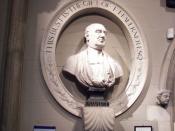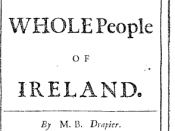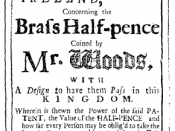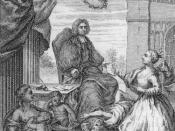Keane 1Throughout the eighteenth century, Ireland was enduring a period of turmoil, with England making strong attempts to colonize the island. As oppression towards the Irish from the British intensified, the Irish (especially the Irish Catholics) saw their rights and liberty begin to fade even further into British hands. Just as British tyranny began to climax, Jonathan Swift was positioned in Ireland and began to recognize the British cruelty towards the Irish. Swift remained in Ireland witnessing British rule, and his tolerance for their authority lessened. While Swift held his position as dean of St. Patrick's Cathedral in Dublin, he had a positive impact on Ireland and the Irish citizens, highlighting the awful control England possessed over Ireland (Hachey et. al. 32).
Swift saw his assignment at St. Patricks' as a disappointment as he was searching for a higher position in the Church of England. In a letter back to English friends, Swift described that he was living in, "wretched Dublin, in miserable Ireland" (Irish Experience 32).
He also stated, in reference to how he was born in Dublin, that he: "happened to be dropped here" (Hachey et. al. 32). Although Swift was initially enraged with his situation in Ireland, he soon set aside his anger in response to British repression.
Swift's attention was first attracted by the Penal Laws which were harshly aimed towards Irish Catholics. He was "appalled" (Hachey et. al. 33) at how these laws prohibited Catholics from practicing law, purchasing land, and teaching Catholic education among other things. However, it was not until the Declaratory Act of 1720 that Swift truly progressed in defending the Irish. Under the act, the British Parliament received the right to rule and dictate IrelandKeane 2without the approval of the Irish Lords and Commons. In response, Swift lead a movement for "Protestant Patriotism" in which he wrote A Proposal for the Universal Use of IrishManufacture⦠Utterly Rejecting and Renouncing Everything Wearable That Comes from England. The text, published anonymously, strictly criticized an English ban on the export of woolen manufactures. Hachey proclaimed, "Swift became spokesman of the Irish Protestant merchants" as his Protestant Patriotism prompted him to publish his first text defending the Irish (Hachey et. al.34).
In addition to A Proposal for the Universal Use of Irish Manufactureâ¦Utterly Rejecting and Renouncing Everything Wearable That Comes from England, Swift also published the Drapier's Letters under the pseudonym M.B., Drapier. The letters were aimed sarcastically towards William Wood, who minted the halfpence to be used in Ireland. Swift attacked the English government's attempt to instill their currency in Ireland, as the Irish Parliament was outraged from not being consented over the issue of the halfpence. The effectiveness of the Drapier's Letters was due to their focus on self and national interest. In the letters, Swift noted that Irish Catholics had no part in the strong opposition towards the halfpence, though internally he knew they did, due to their self-interest economically (Hachey et. al.34).
This confusion over whether Swift was defending the Catholics or exclusively the Protestants was cleared in A Modest Proposal for Preventing the Children of Ireland from Being a Burden to Their Parents or Country. In this work written in 1729, Swift stated his backing of all Irish citizens although satirically attacking "the whole People of Ireland" (Hachey et. al. 35). He sarcastically wrote how the impoverished Irish could enhance their life by using newly bornKeane 3infants for food and clothing. He wrote, "⦠a young healthy child well nursed is at a year old most delicious, nourishing, and wholesome food, whether stewed, roasted, baked, or boiled" (Hachey et. al. 35). Swift's belief in defending all of the Irish community was presented through A Modest Proposal, as its main intent was to mockingly attack England's mistreatmentof Ireland. However, Swift clearly criticized the English government writing, "For this kind of commodity will not bear exportation, and flesh being of too tender a consistence, to admit a long continuance in salt, although perhaps I could name a country, which would be glad to eat up our whole nation without it" (Hunter). This quote, directly from Swift's proposal, uses a sarcastic approach to announce how England would be quick to place Ireland under their rule regardless of the desires of Irish citizens.
Swift concluded his cynical works that ultimately defended the Irish after reading The Craftsman. This journal, written by Swift's Tory friends, William Pulteney and Bolingbroke, criticized the Whig government in Walpole for the recruiting of seven hundred fifty Irish soldiers. In the Answer to the Craftsman, Swift sarcastically critiqued The Craftsman. The Answer to the Craftsman stated how sending more Irishmen off to war would be beneficial. This way, the Answer to the Craftsman mockingly noted, there would be more land to turn into pastures with farmers at war. The journal continued to write that ultimately, Ireland would become one large pasture with only English occupants. This work certified that "Swift had mastered the irony of the Irish dilemma" (Hachey et. al. 39). Swift's final attempt to jab at the English government certified his position as an Irish hero.
Keane 4Although Swift was initially upset with being positioned as dean of St. Patrick's Cathedral in Dublin, his stay in Ireland and recognition of English tyranny developed his legacy as a hero amongst the Irish. His sarcastic letters and journals highlighted the extreme English oppression towards the Irish. Swift's work decisively helped the repeal of Poynings' Law and in celebrating this repeal Henry Grattan proclaimed, "Spirit of Swift! Spirit of Molyneux! Your genius has prevailed! Ireland is now a nation" (Hachey et. al. 39). Swift's genius referred to his prolific use of sarcasm in showcasing strong British rule over Ireland. He was so greatly beloved by the Irish that his epitaph called Swift, "a champion of liberty" (Hachey et. al. 39).
Works CitedHachey, Thomas, et. al. The Irish Experience. Armonk, New York: M.E. Sharpe, 1996.
Hunter, Mike. "A Modest Proposal." The Comics Journal. 9 Sept. 2001. 27 Sept. 2008.





